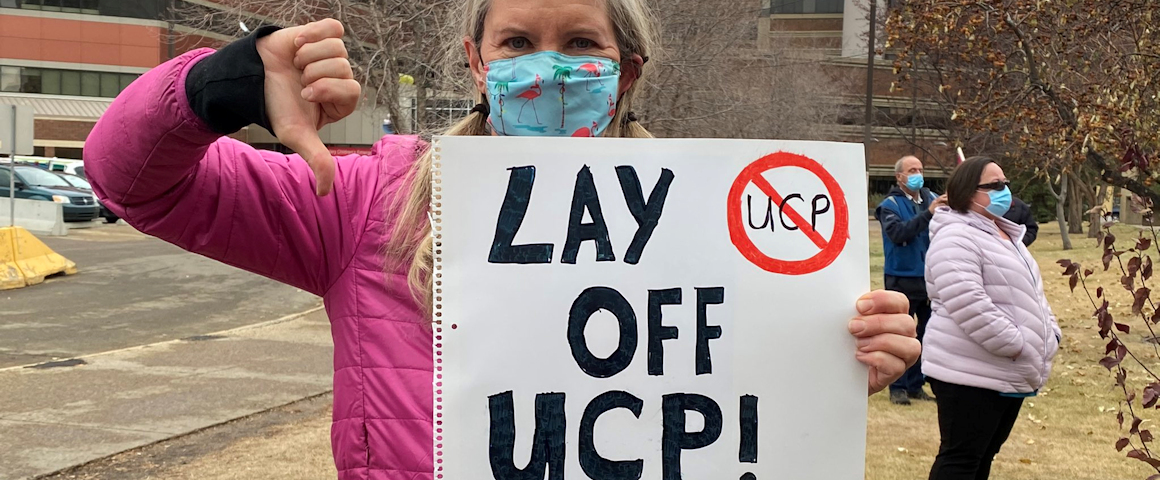By Corinne Benson
From what I have unfortunately had to witness personally, it is hard to imagine making Alberta’s workers’ compensation laws worse.
I have been to the funerals of two Chilean Canadians, who escaped being dumped into the sea by Pinochet only to die from preventable diseases – silicosis and mesothelioma – that they contracted in their workplaces in Canada. In one of these cases, I personally witnessed the day-by-day effect which the illness had on the worker and his family. I heard how they barely could feed themselves while they were on welfare. I heard how the Workers’ Compensation Board (WCB) would phone him, knowing he was going to die, to ask if he was willing to work part-time. I heard of his children mopping up the blood which he vomited as a result of the silicosis. Finally, the court gave them a settlement, saying that the WCB had not given any consideration of how their treatment of him affected his mental health, but every battle along the way was agonizing.
This is how bad it already was. Now Jason Kenney is making it worse, by gutting portions of the Workers’ Compensation Act and completely replacing the Occupational Health and Safety Act.
Bill 47, the Ensuring Safety and Cutting Red Tape Act, is a 152-page omnibus bill that was passed in December. The Alberta Federation of Labour (AFL) warns that the bill “hollows out basically every major component of a good workplace health and safety system and also restricts access for injured workers to recover and start working again.”
Among the changes, Bill 47 reduces appeal options for injured workers and shortens the timeline for workers to make appeals; removes nearly $275 million from injured workers by reducing the cost of living adjustment imposing a cap on insurable earnings; eliminates mandatory joint health and safety committees from worksites with multiple employers, jeopardizing workers at oil and gas and construction worksites; strips workplace health and safety programs of mandatory requirements; and eliminates employers’ obligations to maintain health and dental benefits for workers recovering from injury, to reinstate injured workers ready to return to work and to accommodate disabled workers.
The amendments to the Workers’ Compensation Act also include ending presumptive coverage for psychological injuries for most workers, which will remove $230 million from workers who experience trauma at work; closing the Fair Practices Office, the only place for most injured workers (especially non-unionized workers) to receive support for navigating the compensation system; and instructs the WCB to change its funding policies to prioritize employers’ costs over the financial needs of injured workers.
One of the most concerning changes will limit a worker’s right to refuse unsafe work. The AFL notes that “no workers will be involved in investigating unsafe work anymore and workers who refuse unsafe work can be sent home without pay for refusing.” The COVID crisis clearly exposes the implications of this – in trying to support their families and perhaps unaware of the full implications of not having a mask available, workers already feel pressured to work when conditions are unhealthy or unsafe. This law makes it even more difficult for workers to act for their own protection.
While many of these changes will come into effect in April, the imposed financial loss to workers was effective January 1.
Kenney’s rationale for this Bill 47 is to reduce red tape and bring balance back. Workers have always faced plenty of red tape while fighting for justice – this law makes their red tape even longer.
Kenney and the United Conservatives are launching unceasing attacks on everyone. The people are kept fighting on so many fronts that it feels like being caught in a back alley by several attackers. The Alberta Federation of Labour has launched a Stand Up to Kenney campaign, to build resistance through education and mobilization. We must support the AFL in this campaign, including by rolling back Bill 47 and winning a much better Workers’ Compensation Act.
[hr gap=”10″]
Get People’s Voice delivered to your door or inbox!
If you found this article useful, please consider subscribing to People’s Voice.
We are 100% reader-supported, with no corporate or government funding.




